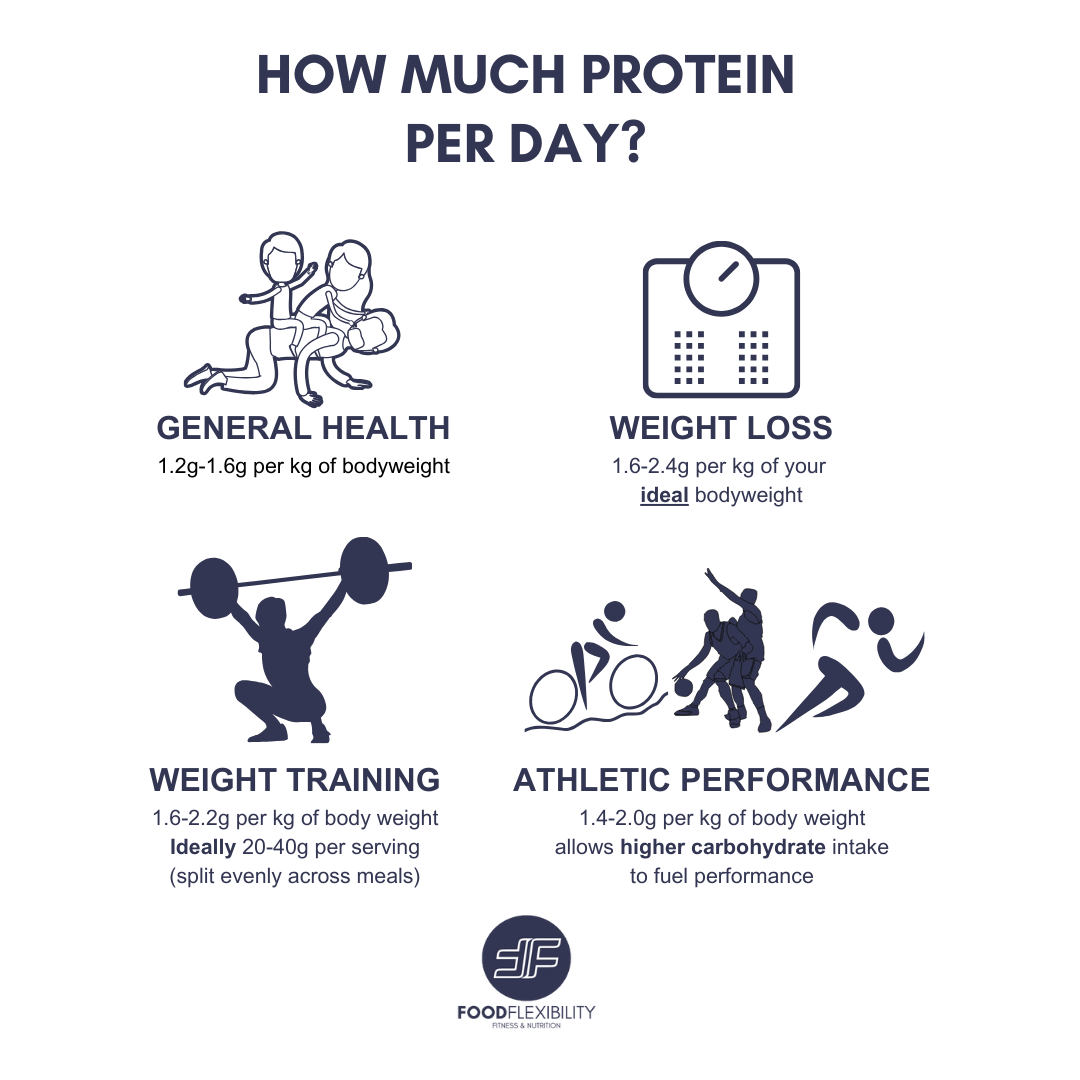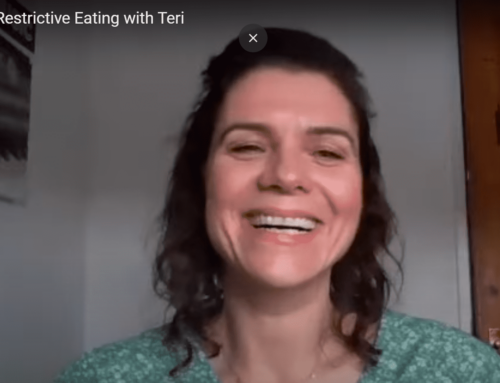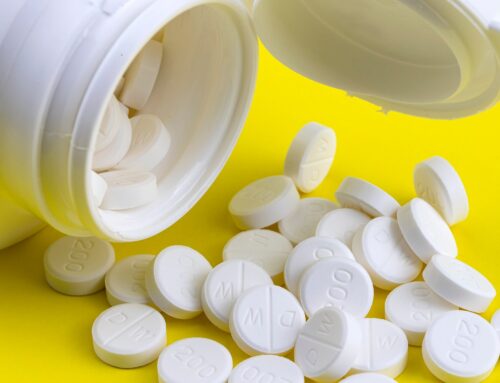Exploring the truth: Is protein really making you fat?
This article aims to give you some context around the claim that extra protein is making you fat.
Once quick scroll through social media and you’ll find a bunch of conflicting health advice.
It’s not just limited to Instagram and TikTok either. Even on a podcast, where there is plenty of room for context and proper explanation, you still see clickbait titles like this:

Is extra protein really making you fat?
Despite what Tim Spector might say (in a podcast title that would be quite at home in the Daily Mail) extra protein won’t make you fat if you eat an appropriate number of calories.
This article will give you the scientific evidence around that statement.
You’ll also hear how this podcast had a really negative impact on a lady I met a few months ago.
I’ll cover popular misconceptions about protein intake, and you’ll learn how too much protein probably isn’t the biggest issue for fat gain.
Because, whether you’re trying to shed a few pounds, gain a little muscle or just be healthy protein in your diet is important.
So, get ready for a little bit of myth busting about protein and its impact on your waistline.
Read the article to the end and you’ll have the knowledge to separate the facts from fiction when it comes to protein and decide for yourself if it’s actually going to make you fat.
What does protein do for your body?
Protein plays many essential roles in your body.
It is the building block of life, helping your body to repair and grow tissue, muscles, bones, skin, and blood.
Proteins produce enzymes, hormones, and antibodies, which are essential for the various functions in your body.
Sounds important doesn’t it!
Well, it is.
Your body requires a steady supply of protein to grow, repair, and maintain cells and tissues.
Protein-rich foods such as meat, fish, eggs, dairy products, legumes, nuts, and seeds are your main sources of this macronutrient.
Because proteins differ in their amino acid profiles (the type of building block) and bioavailability (how easy they are to absorb) it’s important to eat a variety of sources.
Your body can’t produce its own amino acids so you must get them by eating protein.
Debunking the myth: Can extra protein make you fat?
A popular myth about protein is that it leads to weight gain.
If you’ve listened to the podcast you might also think that most of us eats more than enough protein.
That’s not a new one but it’s probably unfounded.
Here comes the science… please bear with me whilst I break a few things down.
Looking at US statistics from 2014, the average adult intake of protein was 88.2g per day (1.1g/kg or 14-16% of total calories).
The recommended amount is 10-35% of calories.
Simple maths tells you that’s not ‘too much’.
If we look at UK numbers, the British Nutrition Foundation states:
“The average daily intakes of protein in the UK are 76.0g/day for adults aged 19-64 years, and 67.0g/day for adults aged 65 years and over. This is more than sufficient and exceeds the RNI*…”
Those numbers seem to back up the claim in the podcast.
But, context is always key.
*RNI means Reference Nutrient Intake. If the average intake of a group is at the level of the RNI, then the risk of deficiency in the group is very small.
Remember, avoiding deficiency is not the same thing as thriving.
Those numbers from the BNF are for people who don’t move very much (sedentary).
But the BNF also state that if you are more active (very important for being healthy), you’ll more protein (1.2 to 2.0g/kg/day).
Although it’s unlikely that people who can afford to eat well will end up clinically deficient in protein, if you want to thrive, not just survive, then exercising regularly and eating enough protein is a good idea.
Of course, if you have a pre-existing kidney condition then your own doctor may have advised you to follow a lower protein diet. In which case follow their advice.
Will extra protein make you fat?
Extra protein will only make you fat if it leads to you eating more calories than you need.
Some protein-rich foods, particularly animal-based sources, contain higher levels of calories.
That’s because animal proteins often contain more fat compared to plant-based sources (but not always).
So, many people blame protein for expanding waistlines when the real issue is calories.
Although fat is calorie dense, it’s essential for health. The goal is never to eat zero fat but to be mindful that fat contributes more calories per gram than carbohydrate or protein.
- If the amount of protein that you eat does not create a calorie surplus, you won’t gain fat [here’s a study supporting that]
- Protein has a satiating effect – meaning it can help control appetite which reduces overall calorie intake.
- Protein also helps to preserve lean muscle, which then reduces the decline in your metabolism as you age.
That last bullet point is important.
If you want to lose fat (what most people mean by ‘losing weight’) then you need to eat fewer calories than you burn.
When your body has less energy than it needs, it turns to its tissue stores (fat and muscle) for energy.
You’ll be healthier and more self-sufficient if you lose fat rather than muscle so it’s a good idea to eat an elevated amount of protein to prevent muscle being used for energy.
As you age your muscle naturally declines (age related sarcopenia) which eventually leads to frailty.
But by staying active, strength training and eating enough protein you can offset those changes and be more of a badass for longer.
Including being able to get up off the toilet without the help of your partner in your old age.
Diary of a CEO fact checked: Why implying protein makes you fat is not helpful
What’s the harm in the podcast you might ask?
It’s the title!
I spoke to an older lady last month who has a very fragile relationship with food and her body image.
Post menopause she knows it’s important to strength train. She really didn’t want to start losing her hard-earned muscle and end up too frail to enjoy her retirement.
One clickbait podcast title and she is now terrified of increasing her protein intake above 60g per day to properly support her strength training in case she gets fat.
‘Oh, that’s not what Tim Spector was saying’ I hear you cry…
So why did he sign off on this podcast title:

Anyway, extra protein won’t make you fatter provided you are eating an appropriate number of calories (check out my article on how to do that without daily counting here).
In fact, extra protein might even make fat loss easier and has a good chance of making you more of a badass in later life.
The research that supports eating more protein for health and fat loss
There is plenty of evidence showing that eating more protein is beneficial for weight loss.
This research paper summarises that very nicely.
Here’s the abstract:
Substantial evidence supports the increased consumption of high-quality protein to achieve optimal health outcomes. A growing body of research indicates that protein intakes well above the current Recommended Dietary Allowance help to promote healthy aging, appetite regulation, weight management, and goals aligned with athletic performance. Higher protein intakes may help prevent age-related sarcopenia, the loss of muscle mass, and strength that predisposes older adults to frailty, disability, and loss of autonomy. Higher protein diets also improve satiety and lead to greater reductions in body weight and fat mass compared with standard protein diets, and may therefore serve as a successful strategy to help prevent and/or treat obesity. Athletes can also benefit from higher protein intakes to maximize athletic performance given the critical role protein plays in stimulating muscle protein remodelling after exercise. Protein quality, per meal dose, and timing of ingestion are also important considerations. Despite persistent beliefs to the contrary, we can find no evidence-based link between higher protein diets and renal disease or adverse bone health. This brief synopsis highlights recent learnings based on presentations at the 2015 Canadian Nutrition Society conference, Advances in Protein Nutrition across the Lifespan. Current evidence indicates intakes in the range of at least 1.2 to 1.6 g/(kg·day) of high-quality protein is a more ideal target for achieving optimal health outcomes in adults.
The science behind protein and weight management
You’ve already read that extra protein can only make you fat if you eating in a calorie surplus for an extended period. Fat is just excess energy body has stored for future use.
If all you ate was protein (bad idea) you would gain fat if your calories were too high.
That would be difficult though because protein is known to reduce appetite.
Which is why a high protein diet is a well-recognised and proven strategy to support and maintain fat loss.
High fibre diets also help with weight management by helping you feel fuller and are universally recognised as a good idea for health too.
A diet rich in protein and fibre would certainly be recommended by any credible nutrition professional.
So just focus on fibre if you like but please realise that only protein can directly contribute towards maintenance.
Developing muscle isn’t about becoming a bodybuilder either (unless you want to).
Stronger people tend to be more active which leads to them finding it easier to maintain and lose weight.
More active people tend to be less frail in later life too.
Take home points:
- A diet rich in protein typically supports fat loss and improves body composition.
- Good nutrition is never down to one thing, a diet which is calorie appropriate, high in wholesome foods including lean sources of protein, fruits, and vegetables and rich in fibre is going to be good for your health and most supportive of fat loss.
In that context, extra protein isn’t making you fat.
Protein sources and their impact on weight
Not all protein sources have the same number of calories per serving.
Because foods are usually a mixture of proteins, fats, and carbohydrates.
Protein and carbohydrate provide 4 calories per gram whereas fats provide 9 calories per gram.
While animal-based proteins provide essential nutrients, the fat content varies quite a bit. For example, 100g of pork belly has significantly more fat than 100g of lean pork loin so being aware of calories is important.
On the other hand, plant-based proteins offer fibre, vitamins, minerals, and antioxidants, but are often lower in fats.
Again, fat content varies. 100g of almonds providing 20g of protein and almost 600 calories whereas 200g of lentils gives 20g of protein for 230 calories (almost double the serving size for half the calories).
Remember, the goal is never to eliminate fat from your diet just to be aware of the calories it brings.
As the old saying goes, variety is the spice of life and when it comes to health that’s no different.
Eating a wide variety of different protein sources allows you to reap the benefits of different amino acid profiles (a full set of building blocks) and micronutrient content, while minimising potential risks from lack of variety.
How much protein is too much?
As with pretty much everything in life you can have too much of a good thing.
Identifying how much protein is right for you ant your goal is key. It means you’re not squeezing out other nutrients by ‘using up’ all your calories on protein at the expense of carbs and fats.
I’ll give you ranges specific to your goal shortly that will help with that.
Is high protein bad for your kidneys?
Current research suggests that higher protein intakes than the recommended dietary allowance (RDA) of approximately 0.8 grams per kilogram of body weight have a trivial to non-existent effect on kidney health for those with no underlying issues with kidney function.
How much protein is good for your health?
If you’re anything like me, no doubt you want to thrive rather than survive.
This meta-analysis (comparing independent studies on a subject to determine trends) found that intakes above the RDA of 0.8g per KG resulted in a significant decrease in hip fractures compared to a lower protein intake.
Now, you may not be susceptible to a hip fracture right now but fast forward into your 80s, 90s and beyond and that becomes a problem.
So, base your protein intake around your goal as follows:
- General health: 1.2-1.6g/kg per day
- Maximising muscle growth: 1.6-2.2g/kg per day
- Fat loss (with resistance training): 1.6-2.4g/kg per day
- Athletic Performance (not dieting): 1.4-2.0g/kg per day.

If you have some fat to lose and those numbers look high base things on your goal bodyweight.
Couple those recommendations with an appropriate calorie intake and eating extra protein won’t make you fatter.
Balancing protein intake with other nutrients
So hopefully you’re coming round to the idea that extra protein won’t automatically make you fat. Just remember that it’s equally important to have a well-rounded diet that includes all essential nutrients too.
Carbohydrates, fats, vitamins, and minerals are integral components of a balanced approach. Carbohydrates are your body’s primary source of energy and crucial for supporting physical activity, cognitive function, and overall metabolic health.
Similarly, fats play a crucial role in hormone production, cellular function, and the absorption of fat-soluble vitamins.
Opting for fats from sources such as avocados, nuts, seeds, and fatty fish can contribute to overall well-being.
So, be sure to strike a balance between protein, carbohydrates, and fats, if you want to optimise your nutrition to support overall health and vitality.
Just like this:


The truth about protein and muscle gain
Firstly, eating protein on its own won’t help you gain masses of extra muscle.
You need to do some strength training to do that.
Combining resistance training with an adequate protein intake stimulates something called ‘muscle protein synthesis’.
This is the process by which new muscle tissue is repaired and built.
If you’re looking to become more athletic, improve strength, and sculpt your physique then you need to eat enough protein.
Eating high-quality protein with every meal and snack will help you to optimise muscle growth but remember, the total daily quantity always matters more than when you eat it.
Protein-rich recipes for a healthy lifestyle
How about a few ideas for incorporating more protein into your diet to pimp them up a little?
One of my favourite places to search is the BBC Good Food website.
Here’s a little video of how to use it to find healthy, high protein recipes:
Whether you choose lentil bolognaise, salmon stir fry or chicken fajitas, you’re only limited by your imagination.
If you’re looking for a sweeter option then there’s always Greek yogurt, cottage cheese with fruit, or even a classic protein smoothie.
As you’ll quickly see you don’t need to make huge changes to incorporate protein into heathy, wholesome and value for money family recopies.
Protein supplements: Do they contribute to weight gain?
Supplements are, by definition, “a thing added to something else in order to complete or enhance it.”.
Which means if your regular food choices give you enough then you don’t need a supplement.
But protein supplements can be super convenient to top up levels after training or when travelling and are a very cheap source of protein.
Just be sure to check the labels so you’re aware of the calories.
As for protein bars, yogurts and other ‘high protein’ products. Again, check the labels to see how much protein and how many calories.
And remember, a protein cookie is just a regular cookie with some protein powder blended in.
If you bought a regular cookie and drank a protein shake, you’d get a tastier cookie, more protein and save some money in the process.
Does that mean a protein Mars bar is ‘bad’?
Of course not, if you enjoy them, can afford them and they help your goals then crack on.
Just remember that supplements are there to complement a well-rounded diet, they shouldn’t form most of it.
Is Tim Spector right about extra protein making you fat?
Listening to the podcast pained me in places, but I got through it.
To be fair the following things are mentioned:
- A calorie surplus is required to cause fat gain.
- You need more protein as you age.
Fundamental points but glossed over very quickly.
I completely agree that you can get enough protein without bars or supplements.
Basing your diet around whole foods, with plenty of fruits and vegetables and increasing your fibre is a good idea for almost everyone.
But the title of the podcast doesn’t say that now does it:

It says “extra protein is making you fatter!” in big letters…
Is it any wonder that the lady I mentioned earlier was terrified of eating more protein to preserve her muscle and strengthen her bones though!
When you read that title, you think f**k, I’m going to get fat if I eat extra protein.
But if calories are controlled you can’t store the energy as fat, regardless of protein intake.
Now people on these high-profile podcasts can often seem highly regarded experts.
Regardless of their status the question is… what do we know about health in relation to nutrition?
Living an active lifestyle whilst eating a diet primarily made up of whole foods, rich in protein featuring a wide variety of plants is a good idea.
Hopefully having read this article you can see the light and shade around protein.
Perhaps you can see that extra protein probably isn’t making you fat but extra calories certainly are.
If I were to re-write the title, it would probably say:
“Filling your shopping trolley with a bunch of items labelled ‘high protein’ will not help you lose weight, and may even cause you to gain weight, unless you control your calories.”
Not quite as snappy but a hell of a lot more helpful…
Conclusion: It’s all about balance
In conclusion, the relationship between protein intake and weight is way more nuanced than “extra protein is making you fat”.
Now you’ve read this article you know how much protein to incorporate into your diet for your goals and how to do that in a balanced way.
The benefits of protein include improved satiety, muscle preservation, and metabolic support.
Keep those protein sources varied, eat wholesome foods, move daily, and manage stress and you’ll give yourself a great shot at improving your overall well-being.
Whether your goal is to achieve a leaner physique, enhance athletic performance, or simply embrace a healthier lifestyle, protein really is the cornerstone of your nutrition.
Just be aware of calories.
Hopefully you’re now armed with the knowledge and confidence to optimise your protein intake for your own goals and become a leaner, fitter, more capable, badass version of yourself.
Of course, if you have a question or are confused about anything in this article then please post in the comments.
Thanks for reading!
References: Credit to Alan Aragon
Now I’m not a research scientist and there is a great deal of skill in reading research.
Interpreting research is a skill that takes years to build, knowledge of the existing body of evidence to put things into context, and advanced statistical skills to spot methodological flaws.
So, I have left that to the experts. Namely Alan Aragon and his excellent book Flexible Dieting. Alan is a world-renowned nutrition researcher. His job is to understand the research properly and to think critically.
The references you see linked in this article are the same Alan uses in ‘Flexible Dieting’. Science is always evolving but I believe Alan’s work to be a true reflection of the scientific evidence as it stands at the time of writing.


